- Home
- Richard Lee Byers
The Plague Knight and Other Stories Page 16
The Plague Knight and Other Stories Read online
Page 16
Tahmasp ignored the coin. "But you do need me! I know who you are, Lord Dorian! In faraway Persia I heard your spirit moan and hastened here to help you. My Art drew you into my presence tonight."
Dorian shook his head. "I doubt that you've seen Persia in years, if ever. I suspect you've been here in the duchy for a while now. Long enough to learn what I look like, and to listen to gossip about my recent . . . disappointment. And anyone could claim after the fact that a chance encounter happened by design. Take the money, magician. Quit while you're ahead."
"Someday," said Tahmasp, "you must learn to see beneath even such unimpressive surfaces as my own. Tahmasp is more than he appears to be, as he will demonstrate by delineating your situation. Your father the Duke has gone to fight the river pirates. You are now old enough to accompany him and further your education in the craft of war. Nevertheless he left you behind."
Dorian scowled. "Everyone knows that."
“But I also perceive all that the Duke, his officers, and you yourself have taken pains to conceal. I know that your parents have always considered you an odd child, with strange moods and stranger fancies. Doubtless they would have grown truly worried about you, had they realized you sometimes hear voices when lying alone in your bed."
Dorian gaped at him. He'd never told anyone about the voices.
"Eventually," Tahmasp continued, "another matter roused their grave concern. Last autumn your sister Freda, a child you'd always doted on, fell from her horse during a steeplechase. She died twelve hours later in horrible pain. The rest of your family grieved -- how they grieved! -- but you became dispassionate and aloof, as if you didn't care about your bereavement or anything else. You only emerged from the malaise a month ago. And now, though they won't say it outright, your family fears you're prone to madness. Unfit to undertake any manly duties, let alone inherit the throne."
"How can you know these things?" Dorian demanded.
Tahmasp smirked. "1 can't explain in terms you'd understand. Fortunately, it doesn't matter. What does is that I want to help you."
"Why?"
"I sometimes glimpse the future, though less clearly than the secrets of today. I discern you have a destiny, young lord." Tahmasp grinned again. "And if that reply seems cryptic, suffice it to say that when you reach your majority, you'll be in a position to dispense a great many silver marks."
"All right," said Dorian slowly, "how do you propose to help me? You're a stranger. Sorcerer or not, I don't think you could persuade Father to add me to his expedition, not through argument alone, and I can't allow you to cast a spell on him."
"Your parents' anxieties need not concern us," the pudgy magician said. He began to adjust his disorderly turban, trying to keep it from unwinding altogether. "Unless your madness recurs, their fears will fade in time for you to accompany your father on his next martial excursion, or the one after that. What we must address is your own morale, young lord. Your self-doubt and sense of shame."
Dorian flinched. "You've lost me."
Tahmasp shook his head. "No, I have not, and we both know it. Your parents' lack of faith wouldn't cut quite so deeply if you didn't share it. You don't understand your moods, your hallucinations, or your reaction to Freda's death any more than they do. Like them, you fear that you're going insane."
The boy glowered at the older man, who in the last few moments had come to seem a merciless accuser. "That's not true!"
"No?" Tahmasp shrugged. "Well, in any case, I've come to invite you on a military expedition all your own. In a far land dwells a sorcerer king called the Ice Lord, a tyrant so cruel he cursed his own realm with perpetual winter."
Dorian snorted. "Are you making sport of me? This sounds like the beginning of a fairy tale."
"Does it?" Turning, Tahmasp swung his arm toward the crumbling wall behind him. "Behold."
Dorian peered at the spot the magician had indicated. For a moment, he saw nothing unusual, and then a doorway no larger than a pauper's coffin shimmered open before him.
Beyond the breach, nothing was as it should have been. A small red sun shone wanly on a vast expanse of ice. In the center of the desolation rose a black basalt castle, the stonework so roughly hewn as to suggest that the structure had been carved from a natural rock formation.
Dorian occasionally fell prey to an odd conviction that he was dreaming, and the sensation had never been as strong as it was right now. But when, half entranced, he moved closer to the gap for a better look, a gust of frigid air whined through, chilled him, and blew the feeling of unreality away.
Awed, he turned back around. "This is a magic gate!" he babbled. "To another world, perhaps, or another time!" His philosophy tutor had spoken of such things. "And you -- you're one of the great sorcerers, aren't you?"
Tahmasp salaamed. "The young lord does me too much honor. Now, the subjects of the evil king cry out for deliverance. How would you like go to their aid and slay him?"
Dorian goggled at him. "Me? By myself?"
"Why not? You're a trained warrior, aren't you, the scion of a line of heroes and a man of destiny besides. Moreover, the poor wretches in the winter kingdom have a prophecy. A champion armed with a blade of light will slay the oppressor, and I propose you carry this." Abruptly he held a long silver rod with a ruby tip in his fleshy, short-fingered hands.
Dorian gave a start at the weapon's sudden appearance. "A flamelance!”
“A commonplace in your milieu, a marvel elsewhere. Wield it in the cause of justice. Embark on a greater adventure than the one your father denied you. Prove your reason and your manhood."
Dorian hesitated. He suspected that he truly would be mad to undertake this quest, but he yearned to try. And if a wonder-worker like Tahmasp believed he could kill the Ice Lord, then perhaps it was actually possible.
His lips stretched into a reckless grin. "I'll do it."
Urlik Skarsol, Prince of the Southern Ice, screamed and jolted upright in his bed. Though his eyes were wide open, for one more moment his nightmare, something about hibernating dragons and a terrifying conversation with a rider in black and gold mail, seemed more real than his sleeping chamber, a trapezoidal room decorated with tapestries, arms, and armor. Then the dream released its hold on him, the details fading even as he strained to fix them in his memory.
Urlik panted as if he'd run a race. His heart pounded, and his wounded sword arm throbbed. He doubted he could fall back asleep, and considering his dreams of late, it was scarcely an appealing prospect anyway. Scowling, he threw off his tangled fur covers.
The cold air stung his muscular, naked body. Clumsily he pulled on his woolen shirt, lacquered leather breeks, leather jerkin, and sheepskin boots. Hung his aching, bandaged arm in a linen sling. Dragged an ivory comb through his tangled black mane and beard. Turned toward the long ebony box on the marble table, then hesitated.
The black broadsword in the coffer was a thing of ill omen, an enchanted weapon notorious for slaughtering the wielder's friends. Yet for all its drawbacks, it could make its bearer all but invincible, and Urlik reluctantly wore it when he knew he was heading into danger. And he felt that way now.
But for the first time in years, the feeling was only an illusion, an aftereffect of the nightmare. Or rather, the remaining peril was one no blade could avert. Frowning, he buckled on a sword of common steel -- the war had lasted too long for him to feel comfortable without some means of defense -- and set forth to roam the gloomy passages of the Frozen Keep.
The basalt castle was still full of bedridden soldiers, casualties of the final battle, and he spent the next two hours looking in on them. He told himself it was all he intended to do. Yet all the while his path carried him downward, and when he found himself before an iron-bound door lit by one of the flameless crystal lamps of the Ancients, he couldn't delude himself any longer. He meant to argue with Khashai yet again.
I'm like a child picking at a scab, he thought as he advanced. The sentry, a burly fellow clad in an intricately wrou
ght breastplate and greaves and armed with a pike and falchion, snapped to attention. Urlik exchanged pleasantries with him, then passed on through the door and down the dungeon stairs.
The Prince was usually at ease in the fortress, but in the tunnels he invariably felt oppressed by the sheer age and ponderous mass of the place. It annoyed him that Khashai insisted on working down here. Of course, several things about her irked him these days. When he reached the entrance to her laboratory, he yielded to a churlish urge to treat her discourteously. He opened the door without knocking, then froze in shock.
Before him was a circular chamber built ten feet below the level of the adjacent corridor, with stairs linking the doorway to the floor. The air smelled of moldering parchment and bitter incense, while bone wands, sealed vials of seething phosphorescent vapor, fossils, wax dolls, mummified birds, and sundry other appurtenances of the Black Arts littered the various tables. Disquieting as some of these articles were, Urlik had had ample opportunity to grow accustomed to them. What dismayed him was a translucent blue-white sarcophagus, gleaming like ice on a black marble bier at the very center of the laboratory.
"You've already built it!" he cried.
Khashai jerked around and peered up at him. "1 had to," she said softly, "or my own dreams would have given me no peace." The sorceress was tall and slender, with a generous mouth, emerald eyes, and flowing auburn hair. She looked as if she'd just come into the flower of her womanhood, though the appearance was deceiving. She'd been a frequent guest at the court of Urlik's grandfather.
Scowling, the Prince stalked down the stairs. He wondered if he could shatter the coffin with his sword. "You can construct the foul box, but you can't make me climb inside."
She advanced to meet him, her green skirt swishing on the floor. "Of course not, nor would I if I could." Her creamy face twisted, then smoothed again, as if she was struggling to mask some bitter pain. "We've shared so much. Do you truly believe I could ever wish you ill, or hope to bid you farewell?"
When he saw how his resentment hurt her, the feeling crumbled into shame. Forgetting his injury, he started to reach for her, and the arm in the sling twinged. Sighing, he drew her into an awkward one-handed embrace. "No, my darling, of course I don't. It's just that I'm frightened, and this isn't fair! We bled and struggled eleven long years and we won! My fellow Ice Lords and thousands of others traded their lives for our victory. No one should be required to sacrifice any more."
"I feel the same way," she said.
"I know you're a great sibyl," he said. "You proved it often enough in the war. But are you certain of what you've told me?"
The sorceress sighed. "Every time I lie down to rest, the spirits whisper the same things. Your life and achievements in the present are merely prologue. Your true destiny lies in the far future. And my only part is to help you reach it, by fashioning a vessel in which you can sleep until the world needs you."
"Maybe your phantoms are trying to trick us. Maybe they don't want to share you with me."
"If I believed that," she said, "I'd pluck out my inner eye and grow old with you as other women do. But my familiars have never lied to me. And your own soul is speaking through your dreams, urging you onward, warning that trials and horrors still lie before you."
Urlik grimaced. "How inviting. Why do I even hesitate to forsake my love, my friends, and my entire life when I can have 'trials and horrors' instead? You can't even tell me what I'm supposed to do in the future."
"No. The spirits claim they can't explain."
“There might not even be anyone left to awaken me. Everyone agrees the sun is dying. We may be living in the final age of Man." "I suppose," Khashai said, "it's a question of faith."
"Then I think I'll place my faith in my own judgment. Which tells me to bide where I am. If the future needs swordsmen, it can breed its own."
"You say that now," she said somberly. "but what if your nightmares continue, or even grow worse?-
The suggestion chilled him, but she sounded so despondent that he forced a grin to cheer her. "Then I'll drink myself stuporous every night, or cultivate insomnia. My god, lass, I weathered the worst the Specter King and his nigromancers could throw at me. It will take more than dreams to drive me mad!"
Khashai hugged him with all her strength. "All right. It's decided. You're staying and I'm glad! Please, please, don't ever think I wanted you to go!" And then she began to sob, just as if he'd vowed to forsake her.
The feeling of wrongness struck Dorian as soon as he squirmed through the gap in the rocks. For a second he felt as if he were choking. He must have grunted, because Tahmasp turned and peered at him. "Are you all right?" the pudgy sorcerer asked.
Dorian drew a ragged breath. "I suppose so," he said. "I don't think I'm sick, but my skin is crawling. It's almost as if something's telling me I don't belong here."
“What you feel," said Tahmasp, "is the Ice Lord's curse, poisoning the atmosphere. Imagine the plight of the wretched folk who breathe it every day. Come and put an end to their misery." He began picking his way down the rocky escarpment toward the snowy plain below. Dorian glanced back, making sure he could still see Koln on the other side of the fissure, and then followed.
By the time the youth completed the descent, he was less concerned with the nagging sensation of wrongness than with the frigid, howling wind. His slashed velvet doublet, silk shirt, and short, lightweight cape were in no way adequate for this arctic clime. Fortunately, one of his father's sergeants had taught him an old and strictly forbidden soldier's trick to fend off the cold. Shivering, clenching his jaw to keep his teeth from chattering, Dorian tampered with the flamelance until it began to radiate a portion of its charge as heat.
Tahmasp didn't seem to mind the chill. Perhaps he was warming himself with magic.
"Onward," the little man said.
Dorian eyed the approach to the basalt castle dubiously. "Do you mean to cross this bare plain in broad daylight? The sentries will see us coming."
"But they aren't expecting trouble," Tahmasp said. He pointed. "See, the gate is open. With luck, they'll will mistake us for two of their own folk and permit us to enter unmolested."
Dorian frowned. It sounded risky, but he supposed the sorcerer knew what he was doing. "All right. If you think that's the best plan." They set off for the fortress, their footsteps crunching in the snow.
The black castle loomed larger and larger. His mouth dry, Dorian waited for one of the warriors on the wall-walks to sound an alarm or loose an arrow, but none did. Finally the two companions passed unchallenged through the barbican and into a busy courtyard, where the high walls blocked the freezing wind.
Dorian's knees quivered, and he let out a long sigh. Though he knew the danger had only begun, he felt at least a momentary easing of tension. He peered curiously about.
Off to his right, a whistling groom curried a docile, long-legged white bear. The aroma of fresh-baked bread wafted from a doorway. And over in the corner, two grinning soldiers, one of whom was leaning on a crutch, flirted with a pair of washerwomen.
Dorian felt an odd pang of disappointment. Despite a number of exotic details -- most notably the bear -- the scene was essentially prosaic. He supposed he'd been childish to anticipate anything else. Even warriors in the service of a diabolical sorcerer wouldn't spend every moment committing atrocities. Nor would the tyrant's abused thralls normally be found weeping and cringing. They'd try to get on with their lives as best they could.
Still…
Tahmasp nudged Dorian, breaking his train of thought. "Keep moving!" the sorcerer whispered. "Let's not give anyone a chance to remark how outlandish our attire is."
As they crossed the courtyard, walking briskly but, Dorian hoped, not so fast as to arouse suspicion, he wondered fleetingly why Tahmasp didn't disguise them with a spell, or render them invisible altogether. Perhaps the magician had exhausted his power opening the magic portal.
Or maybe he was holding back because the adve
nture was supposed to be a test of ‘the young lord’s mettle.’”
They hurried up a set of stairs and into the entry hall of the keep, a stark, gloomy space with a vaulted ceiling lit by the glow of flameless crystal lamps. "This way," murmured Tahmasp, leading Dorian toward the arch in the far wall. Their footsteps echoed.
Trekking deeper into the donjon, they passed several sickrooms filled with cots and convalescing soldiers. Dorian surmised that the Ice Lord had recently completed a hard campaign, and, judging from the generally cheerful demeanor of the wounded, that the tyrant had emerged victorious. On one occasion a stooped, white-haired servant dusting a collection of seashells eyed the intruders curiously. Dorian tensed until the old man gave a shrug and returned to his labors.
At last Tahmasp raised his hand, signaling a halt. "Around the next bend," he whispered, "is the door to the dungeon, where your quarry may presently be found. Unfortunately, a sentry bars the way, and this one will not permit us to pass. You'll have to deal with him."
Dorian swallowed. He'd studied the martial arts from the time he could walk. Everyone assured him he'd become proficient. But he'd never used his skills in earnest, and now he wondered if they'd serve him as well here as they had on the training field.
He supposed he was about to find out. He made sure the flamelance was set to fire, then stalked around the corner.
The guard, a burly, fortyish man with a drooping brown mustache, possibly grown to hide his crooked yellow teeth, peered at Dorian quizzically. "1 haven't seen you before," he said.

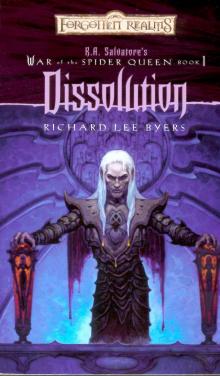 Dissolution
Dissolution Arkham Horror- Ire of the Void
Arkham Horror- Ire of the Void The Haunted Lands: Book II - Undead
The Haunted Lands: Book II - Undead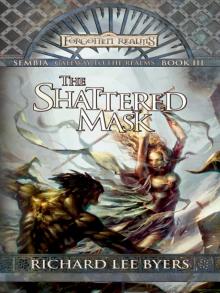 The Shattered Mask
The Shattered Mask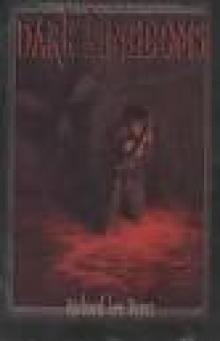 Dark Kingdoms
Dark Kingdoms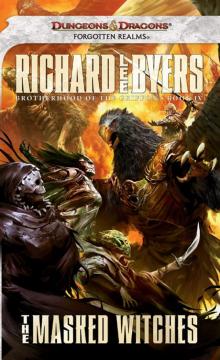 The Masked Witches: Brotherhood of the Griffon, Book IV
The Masked Witches: Brotherhood of the Griffon, Book IV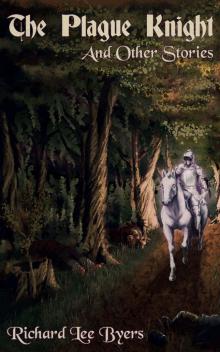 The Plague Knight and Other Stories
The Plague Knight and Other Stories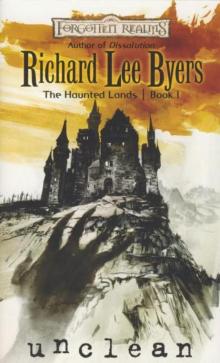 Unclean: The Haunted Lands
Unclean: The Haunted Lands The Captive Flame: Brotherhood of the Griffon • Book 1
The Captive Flame: Brotherhood of the Griffon • Book 1 The Taste of Waterfruit and Other Stories (Story Portals)
The Taste of Waterfruit and Other Stories (Story Portals)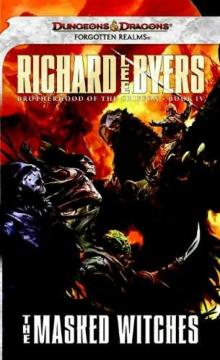 The masked witches botg-4
The masked witches botg-4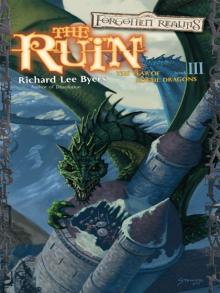 The Ruin
The Ruin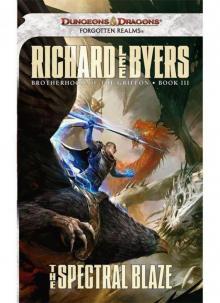 The Spectral Blaze botg-3
The Spectral Blaze botg-3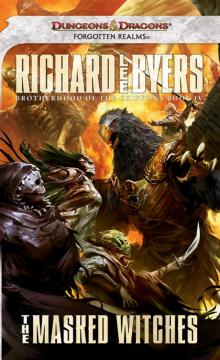 The Masked Witches
The Masked Witches Blind God's bluff bf-1
Blind God's bluff bf-1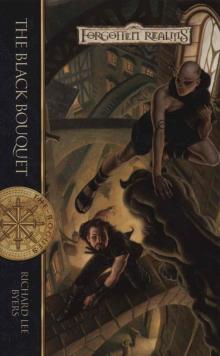 The Black Bouquet r-2
The Black Bouquet r-2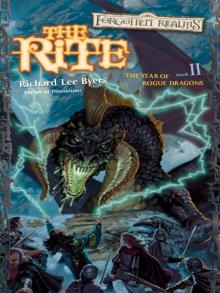 The Rite
The Rite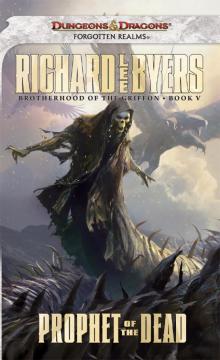 Prophet of the Dead: Forgotten Realms
Prophet of the Dead: Forgotten Realms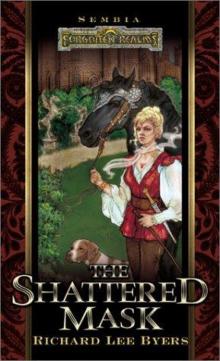 The Shattered Mask s-3
The Shattered Mask s-3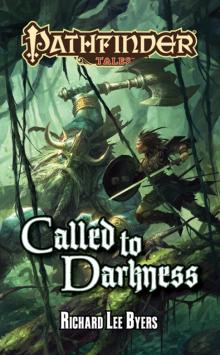 Called to Darkness
Called to Darkness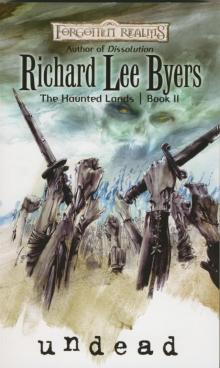 Undead hl-2
Undead hl-2 Blind God's Bluff: A Billy Fox Novel
Blind God's Bluff: A Billy Fox Novel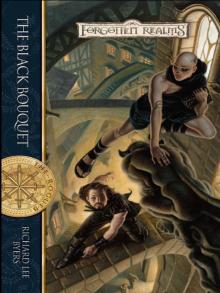 The Black Bouquet
The Black Bouquet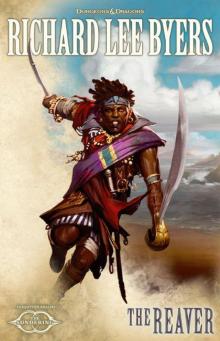 The Reaver
The Reaver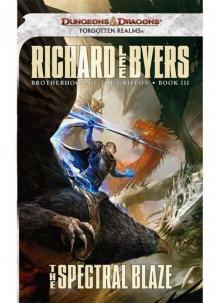 The Spectral Blaze: A Forgotten Realms Novel
The Spectral Blaze: A Forgotten Realms Novel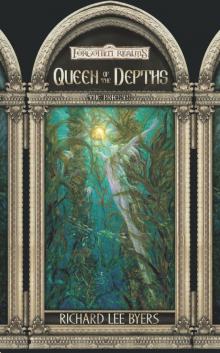 Queen of the Depths
Queen of the Depths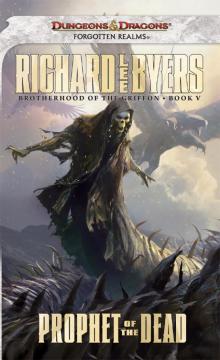 Prophet of the Dead botg-5
Prophet of the Dead botg-5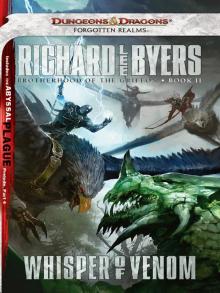 Whisper of Venom: Brotherhood of the Griffon, Book II
Whisper of Venom: Brotherhood of the Griffon, Book II The Captive Flame botg-1
The Captive Flame botg-1 The Haunted Lands: Book III - Unholy
The Haunted Lands: Book III - Unholy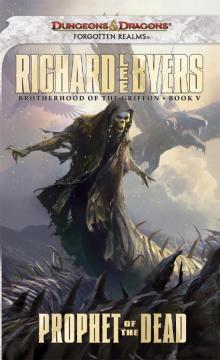 Prophet of the Dead
Prophet of the Dead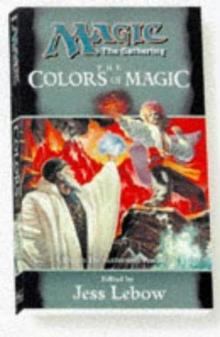 The Colors of Magic Anthology (magic: the gathering)
The Colors of Magic Anthology (magic: the gathering)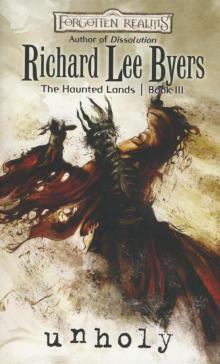 Unholy hl-3
Unholy hl-3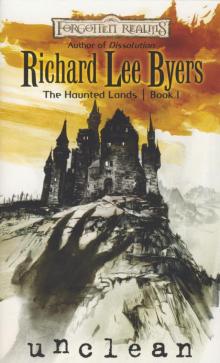 Unclean hl-1
Unclean hl-1 Blind God's Bluff
Blind God's Bluff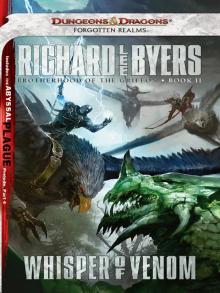 Whisper of Venom botg-2
Whisper of Venom botg-2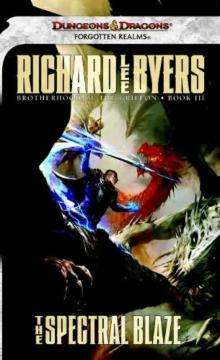 The Spectral Blaze
The Spectral Blaze